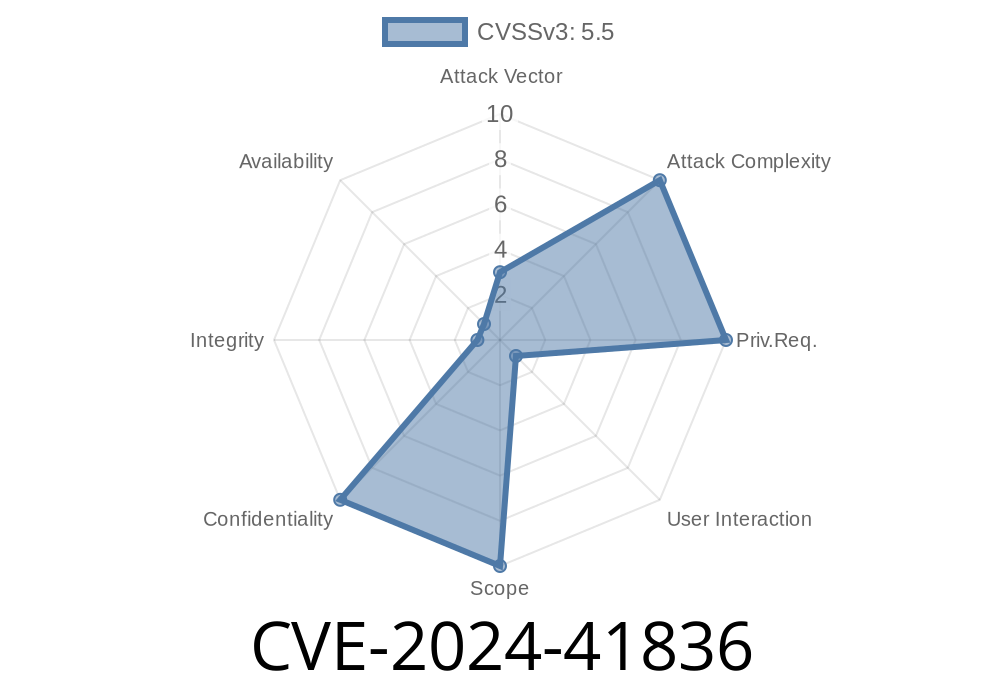---
Adobe InDesign is one of the most popular desktop publishing tools for designers and professionals. Recently, a new security issue, CVE-2024-41836, has been discovered that affects several versions, specifically InDesign Desktop ID18.5.2, ID19.3, and earlier. This write-up will explain the bug in simple terms, show you example code, demonstrate how an attacker could potentially exploit it, and provide resources for learning more.
What is CVE-2024-41836?
CVE-2024-41836 is a NULL Pointer Dereference vulnerability found in Adobe InDesign. If exploited, this bug can crash the application, causing Denial of Service (DoS)—meaning you can’t use the program until you restart it.
This vulnerability is dangerous because it’s triggered by opening a specially crafted malicious file inside InDesign. Exploitation needs the victim’s interaction, so as soon as the user opens the booby-trapped file, the app crashes.
Technical Explanation
A NULL Pointer Dereference occurs when a program tries to use a pointer (an address in computer memory) that hasn’t been set—so it’s “NULL,” or zero. When the code tries to access or write data, it crashes, because it’s looking at a memory location that doesn’t exist. Malicious people can abuse this to make reliable crash exploits.
Here’s a simplified pseudo-code illustration of what might go wrong
// Pseudocode example of a vulnerable function
function processFile(inputFile) {
object = parseFile(inputFile);
// Bug: No check if 'object' is NULL
value = object->property; // This line will cause a crash if object is NULL
}
If parseFile() fails or the file is intentionally malformed, object becomes NULL.
- When the next line tries to access object->property, the program tries to read from ‘zero’ and crashes.
Craft a malicious InDesign file
- The attacker creates an .INDD file with specific data set up to trigger the NULL pointer bug. They may strip required data, corrupt certain sections, or remove key objects.
Send the file to the victim
- The attacker shares this file via email, cloud storage, or other channels, sometimes with social engineering (“Check out this free template!”).
Victim opens the file in InDesign
- Since user interaction is needed, nothing happens until the victim opens the file in the vulnerable version of InDesign.
App crashes
- As soon as InDesign tries to process the malformed data, it dereferences a NULL pointer and immediately crashes.
The victim loses any unsaved work, and must restart the application (and hope autosave worked!).
Important: This vulnerability ONLY allows denial of service (crashing the software). There are no reports of arbitrary code execution with this exact bug (as of now).
Example of an Exploit File (Simplified)
To create an exploit, a researcher might use a hex editor to remove or corrupt a required object in an InDesign file. Here’s a basic Python skeleton demonstrating the concept:
# Malicious InDesign file generator (pseudocode)
with open('legit_file.indd', 'rb') as f:
data = bytearray(f.read())
# Let's say bytes 100-110 need to be present for normal processing
# Remove them to cause processing failure and NULL pointer dereference
del data[100:110]
with open('malicious_file.indd', 'wb') as f:
f.write(data)
print("Malicious InDesign file created.")
Note: This is just a conceptual example. Actual vulnerabilities may require targeted manipulation.
Update InDesign: Adobe has already released patched versions that fix this problem.
- Don’t open suspicious files: Be careful with design files from untrusted sources—especially those found on forums, emails, or sent by strangers.
References
- Adobe Security Bulletin (APSB24-36) — Original advisory from Adobe
- NVD Entry for CVE-2024-41836 — National Vulnerability Database description
- Understanding NULL Pointer Dereference — OWASP community page
Final Thoughts
CVE-2024-41836 is another reminder that desktop publishing tools are also targets for attackers. While this bug “only” crashes InDesign, it can still disrupt businesses and individuals. It’s essential to keep design software updated, always use files from trusted sources, and be aware of social engineering tactics. If you’re a developer, remember to always check for NULL pointers!
Timeline
Published on: 07/23/2024 12:15:10 UTC
Last modified on: 07/24/2024 12:55:13 UTC
